Iraqi Group Claims Drone Attack On US Base In Syria
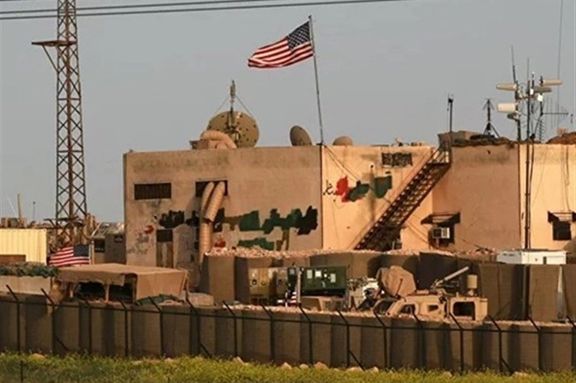
An Iran-affiliated group in Iraq claimed Sunday that it targeted a US military base in Syria with drones, Tasnim news website affiliated with the IRGC reported.

An Iran-affiliated group in Iraq claimed Sunday that it targeted a US military base in Syria with drones, Tasnim news website affiliated with the IRGC reported.
There is no independent conformation of the claim, which comes days after the United States launched an air strike against two targets in Syria belonging to Iran’s Revolutionary Guard (IRGC) in retaliation for earlier attacks on US bases.
Since the October 7 terror attack on Israel, Iranian proxy forces in Syria and Iraq resumed rocket and drone attacks against US bases in both countries. After more than 15 such attacks, Washington retaliates in the early hours of Friday, in what was seen as a limited retaliation.
Hours after the US airstrike, Tasnim quoted the Islamic Resistance in Iraq, a pro-Iran militant group, as claiming that two attacks were launched at US bases, but the US military did not report any incident.
In the latest claim, the Iraqi group said it had launched two drones against a US base in in northeast Syria near al-Hasaka. The report did not provide any other detail.
Tensions have sharply risen as the Israel-Hamas war continues into its fourth week, and Iran threatens that its proxy forces will expand the conflict if Israeli attacks on Gaza continue. The United States has dispatched powerful naval strike groups to the region and has warned others not to get involved in the conflict.
Despite bellicose statements, Iran seems to be cautious, as its main proxy force, the Lebanese Hezbollah has so far not opened a second front against Israel.
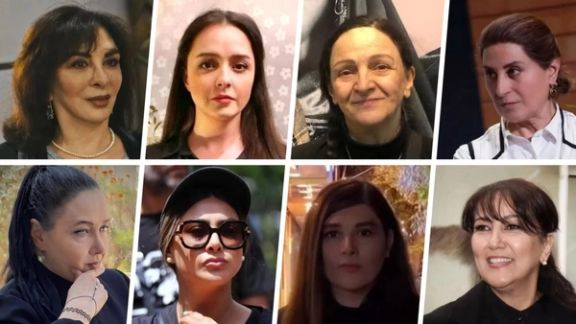
Prominent actresses banned for hijab defiance and supporting protests say not acting is a choice they made to protect their professional dignity before being banned.
“My honor does not allow me to act in [Iran's highly controlled] film industry. Who are you [to ban me]?” Katayoun Riahi said on Instagram in a post that included the photos of the twenty colleagues who were officially banned from acting earlier this week. “I never believed [in the necessity of wearing] the hijab to have ‘removed’ mine now,” she told Iran International TV in November.
“I said goodbye to the world of acting when I was in solitary confinement at Evin prison,” Hengameh Ghaziani, who has also been banned, wrote in an Instagram post. Referring to her interviews with Persian-language media outside Iran, Ghaziani was indicted for “contact with hostile and anti-revolutionary media”.
Pantea Bahram, another banned actress, said in an Instagram story after the release of the list that being banned is the least of her concern, with so many protesters still in prison, and when young girls and boys lost their eyes to the bullets of security forces during the crackdown on protesters in 2022 and 2023.
The ban has met much criticism from others in the film industry. “I feel ashamed of looking at the list in which there are the names of no men. I’m proudly standing with my [female] colleagues until they return [to work],” Mohammad Rezayi-Rad, theater director, announced on Instagram.

Iranian actresses are required to cover their hair in the films they play. The ministry enforces the hijab, as well as censorship of content, by rejecting scripts or modifying them and refusing a public screening license if a film does not meet their requirements.
Banned actresses expressed solidarity with protesters and the anti-hijab movement, often posting photos of themselves without headscarves during last year’s nationwide protests following Mahsa Amini's death in custody.
Riahi, 62, and two other celebrity actresses, Golab Adineh and Fatemeh Motamed-Aria, also showed up with no headscarves at the funeral of popular film director, Kiumars Pourahmad, who tragically ended his own life in April.
Speaking to reporters on the sidelines of a cabinet meeting Wednesday Islamic Guidance Minister Mohammad-Mehdi Esmaili confirmed the ban earlier announced by a ministry official in charge of the film industry.
“We announced before that abidance by the hijab is a legal requirement … I have said several times that those who do not abide by the law cannot work [in the film industry],” Esmaili said.
The list of the banned actresses was released on the same day by the director of the supervision department of the ministry’s Cinema Organization, Habib Ilbeigi.
Some of these celebrities, including Riahi, were arrested for their hijab rebellion. Riahi had to apologize for her defiance under duress during her trial last December. Unable to bear the relentless psychological torment, she passed out and had to be taken to hospital by ambulance. The trial was being filmed, apparently for airing on the state television to discourage others from following suit.
Actresses' open rejection of hijab led to some losing roles in TV sitcoms, the cancellation of entire shows, and censorship of their previous films.
In November last year, House of Cinema, formerly known as the Iranian Alliance of Motion Picture Guilds, said 100 filmmakers and other movie, music and theater personalities had been arrested or banned from work since the Mahsa Movement protests began in mid-September 2022.
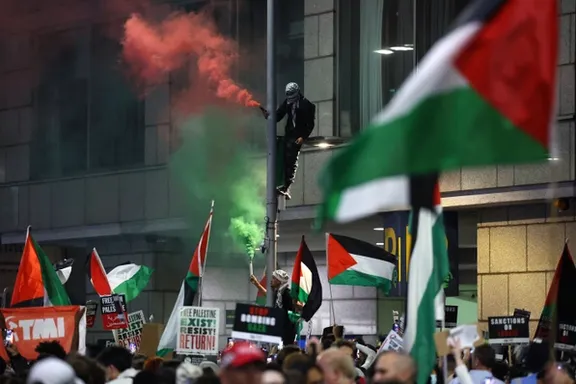
Iranian agents are stirring up unrest in the UK through Gaza protests, according to a report by the British newspaper The Times.
There is direct involvement of the Iranian regime through the physical presence of operatives at protests as well as through disinformation campaigns conducted online.
A third consecutive weekend of pro-Palestinian protests is being policed in London by more than 1,000 officers. Saturday's rally brought out a 100,000 crowd.
The report about Iranian involvement in protests in Britain follows repeated calls for the UK to ban Iran's Islamic Revolutionary Guard Corps. Currently, the British government is under increasing pressure to intensify its campaign against Iran.
During one of the pro-Palestinian rallies in London a British-Iranian activist who has staged a sit-in protest outside Westminster calling for the IRGC to be proscribed as a terrorist organization, was assaulted by pro-Palestinian demonstrators. Vahid Beheshti, 46, said a Hamas supporter threatened to cut his throat.
While a proscription could still happen, it is unlikely that any change will occur soon, according to The Times. Banning the IRGC would lead to "the loss of intelligence-gathering capabilities" since while the United States and Canada have both banned the IRGC, they are reportedly dependent on Britain's influence in Tehran.
However, the British government has increased sanctions, since Mahsa Amini's death in September 2022, as a response to human rights violations committed by the regime's IRGC forces and specifically pledged to enhance protection for Iranian journalists based in the UK in response to the suspension of Iran International's UK operations, which was based on advice from the London Metropolitan Police, following continued threats to its employees.
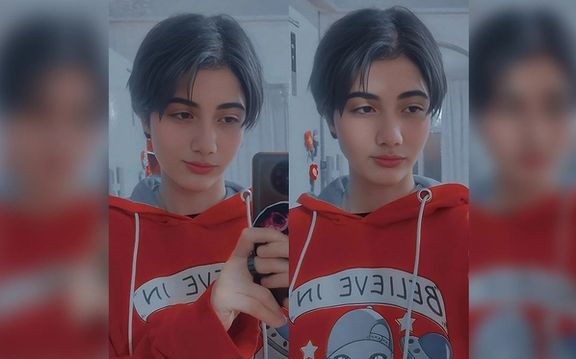
To prevent repeat of anti-regime protests like the Mahsa Amini protests, Iranian authorities have imposed a full ban on reporting about Armita Geravand’s death.
Throughout her month-long hospitalization, the media has been prohibited from reporting anything other than the official account of her death, which was first published Saturday morning by the official government news agency IRNA. Most websites Saturday only republished the IRNA report or did not cover it at all, despite its significance.
“They did not allow us report about the child of [our] motherland,” Shargh daily journalist Maryam Shokrani said in a tweet with the hashtag Armita Geravand. This, apparently, was a reference to the ban on reporting on Armita’s case when reporting on children of Gaza being killed by Israel is even encouraged and could be rewarded.
Another journalist, Saeed Arkanzadeh, tweeted that authorities have assumed the role of narrative makers, believing that they control the public opinion by creating their version of a story and amplifying it through their affiliated media to succeed in establishing it as the correct account of an incident. “is it really that simple?”, he asked.
However, authorities seem to have failed to convince most Iranians, who believe hijab enforcers were responsible for her death. Authorities claim her head injury was caused by low blood pressure and fainting.
People took to the rooftops and windows to chant Armita’s name and against the regime. “Down with the girl-killing regime!”, “Down with the Dictator”, and “Death to Khamenei” in the defiant Ekbatan neighborhood in western Tehran, the close-by Chitgar, and some other areas of the city Saturday evening.
Hours after Armita's death was announced, Tehran Prosecutor Ali Salehi initiated legal proceedings against the prominent reformist political commentator Sadegh Zibakalam and two journalists, Sara Massoumi and Milad Alavi, for their social media posts, along with the administrators of a Telegram news channel called Roozarooz.
According to the Revolutionary Guards (IRGC) linked Tasnim and Fars news agencies, the accused could be charged with lying about Armita’s death, presumably regarding its connection with hijab enforcement hijab enforcement, and for casting doubt on the official account.
Zibakalam expressed his hope that Armita's death would prompt the authorities to reconsider their stance on compulsory hijab. He stated, "How many Mahsas and young Armitas must be buried before the authorities accept that they cannot force people to wear the hijab or remove it?"
Sara Massoumi, a former reporter for the reformist Etemad newspaper, tweeted, "They say that you 'passed.' We have known the trail of blood for years. The city smells of the blood of the mistreated. Did they eventually show your mother all the footage?" She was referring to the authorities' pressure on Armita's mother to confirm the official account on television cameras.
The Geravand family, originally from the western Kurdish province of Kermanshah, is under pressure to keep her funeral as low-key as possible. The family's funeral announcement released on Saturday does not include a photo of Armita; instead, it features an image of a white candle and roses with the words "My daughter."
“The women and girls of this land are censored even after their death,” Omid Tousheh, another journalist tweeted referring to the funeral announcement.
Many other Iranians, including some celebrities, have posted condolences to Armita’s family and all Iranians, as well as their own views on the young girl’s death, on social media.
Actress Taraneh Alidoosti, who has been banned from acting for defying the hijab wrote on Instagram that her decision to stop acting in Iranian films is not because she is not allowed to but because she believes that the headscarf actresses are forced to wear in films "is stained with blood." She stated, "I will not wear the scarf that killed my sisters."
Prominent expatriate opposition figures including Nobel Laureate Shirin Ebadi, Canada-based Hamed Esmaeilion, former Crown Prince Reza Pahlavi, and the US-based activist Masih Alinejad have also condemned the state killing of Armita Geravand.
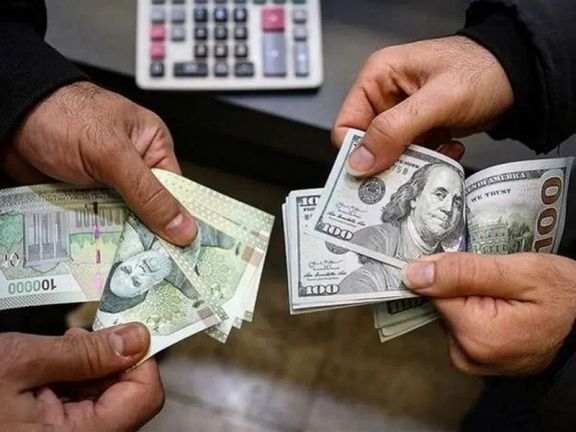
Iran’s currency and stock markets witnessed significant downward pressures on Saturday amid the continuing Gaza war and the specter of a widening conflict.
The escalation of tensions between Tehran and Washington, combined with the start of a new phase of the Israeli ground offensive in Gaza, can have significant negative effects on various aspects of Iran’s economy.
The US dollar climbed to 520,000 rials on Saturday, up from slightly over 500,000 rials during the week. The increase came after a sharp rise on the first day of the conflict between Hamas and Israel when the dollar reached 530,000 rials. However, intervention by the central bank and market stabilization measures led to a slight recovery for the rial.
Iran’s currency has declined by more than 12-fold since 2018 when the United States withdrew from the JCPOA nuclear deal and imposed economic sanctions.
In addition to the currency market, the prices of various gold coins and gold also experienced a significant surge on Saturday. Each gold coin was priced at over 300 million rials, equivalent to nearly 600 US dollars, marking an increase of more than ten million rials compared to the previous week.
The Tehran Stock Exchange's main index faced a decline of 50,000 units, losing over 2.5% of its value and falling below the 2-million-unit mark.
The economic developments come in the wake of a decrease in retail trade and the continuous outflow of real capital from the market which indicated signs of a looming recession.
However, Ehsan Khandouzi, the Minister of Economy, attributed the economic developments to foreign media reports.
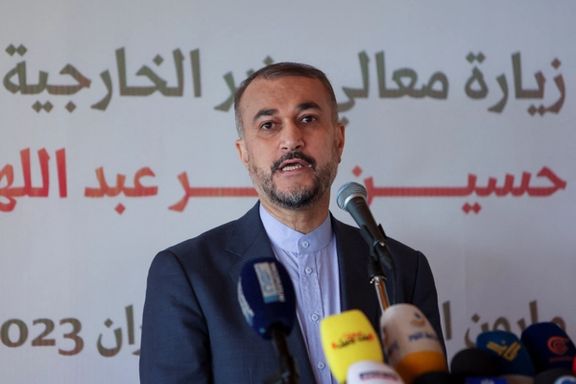
Iran's Foreign Minister, Hossein Amir-Abdollahian, has issued a warning regarding the US support for Israel, as military operations escalated in Gaza on Friday.
In an interview with Bloomberg Television from Iran's mission to the United Nations in New York this week, he expressed his concerns, saying, "The US is advising others to show self-restraint, but it has sided with Israel totally."
His statement has raised concerns about the potential escalation of the Israeli-Hamas conflict into a broader regional war. He refrained from specifying Iran's intended actions but refuted claims that Iran had directed groups in Syria and Iraq to target US forces. Instead, he placed blame on Washington for the escalation of violence following Hamas's attack on Israel.
His warning comes amid worries from Western officials that Iran-backed Hezbollah fighters in Lebanon might launch a series of attacks that could overwhelm Israeli air defenses. The US National Security Council has expressed its concerns to Israel regarding civilian casualties and collateral damage.
The situation remains highly sensitive, with Amir-Abdollahian warning, "Opening of new fronts will be unavoidable, and that will put Israel in a new situation that will make it regret its actions. This has reached the point of explosion, and anything is possible, and any new fronts can be opened up."
Iranian officials have continued to issue blistering statements on the Gaza conflict, but so far their main proxy force in the region, the Lebanese Hezbollah has not fully entered the conflict.